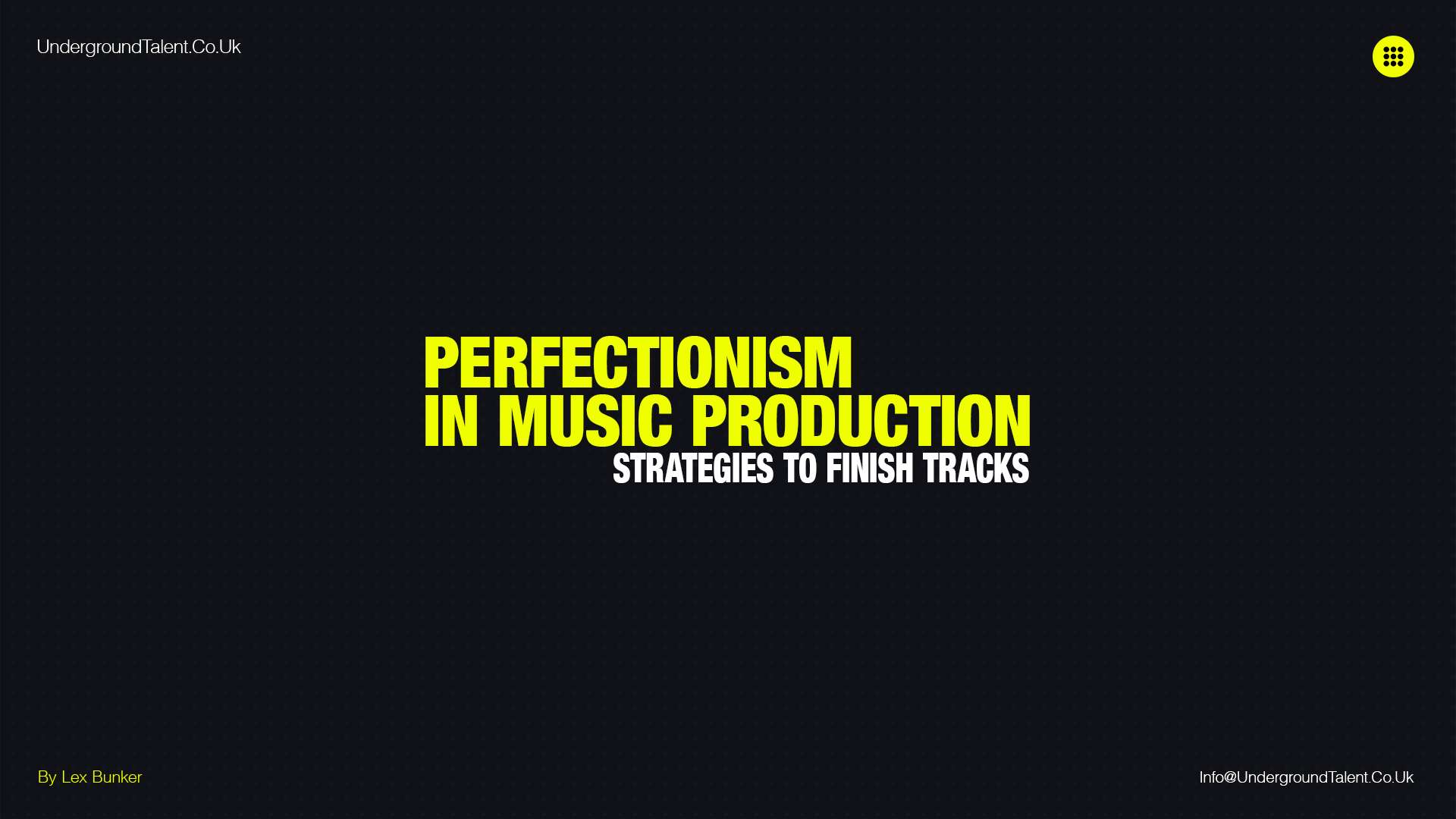Breaking Free from Perfection: A Guide for Music Producers to Finish Tracks | Introduction
Perfectionism in music production can be a double-edged sword.
While it pushes you to excel, it can also halt progress by causing creative blocks. Many producers struggle to complete tracks, bogged down by the pursuit of an unattainable ideal.
Overcoming these blocks is crucial for enhancing productivity and channelling creative energy effectively. Recognizing the signs of perfectionism early helps in addressing it constructively.
By adjusting your mindset to embrace imperfection, you can free yourself from these mental barriers. This not only boosts your output but also improves your overall mental health.
Incorporating strategies to navigate through these blocks will ensure continuous creativity and efficient workflow in your music production.

Understanding Perfectionism in Music Production
What is Perfectionism?
Perfectionism involves setting high standards and striving for flawlessness. In music production, this trait pushes producers to polish every detail exhaustively.
Characteristics of Perfectionism
Perfectionists in music often exhibit meticulousness and a reluctance to share incomplete works. They may redo tracks repeatedly, seeking an elusive perfection.
Impact of Perfectionism on Music Production
The pursuit of perfection can severely impact music producers.
It often leads to prolonged project times and heightened stress. This obsession may stifle creativity, as fear of imperfection might prevent producers from experimenting with new sounds or finishing projects.
Addressing this can unlock a more creative and productive workflow in the studio.
Recognizing Creative Blocks Caused by Perfectionism
 Photo by Andreas Forsberg
Photo by Andreas Forsberg
Common Signs of Creative Blocks in Music
Creative blocks manifest as a lack of inspiration or inability to progress in a project. Producers might feel stuck, repeatedly tweaking the same elements without satisfaction. This often leads to frustration and a drop in creative output.
Types of Creative Blocks Faced by Producers
Producers encounter various types of creative blocks. One common block is the ‘looping syndrome,’ where they loop a small section of music endlessly, unable to move forward. Another is ‘option paralysis,’ overwhelmed by choices in sounds or plugins, leading to indecision. Recognizing these patterns is the first step toward overcoming the obstacles they present in music production.
Overcoming Perfectionism in Music Production
To effectively manage perfectionist tendencies in music production, it’s essential to adopt both psychological strategies and mindset shifts. Here’s a table outlining key approaches:
| Strategy | Description |
|---|---|
| Cognitive Behavioral Techniques | Use techniques like cognitive restructuring to challenge and change perfectionist thoughts and unrealistic standards. |
| Setting Realistic Goals | Define achievable goals that are aligned with personal and professional capacities to avoid feelings of failure and frustration. |
| Scheduled Breaks | Integrate regular breaks to prevent burnout and maintain perspective, allowing for a healthier approach to work and creativity. |
| Mindfulness and Meditation | Practice mindfulness to stay present and reduce the stress associated with perfectionism, thereby enhancing mental clarity and focus. |
| Embracing Imperfection | Adjust your mindset to see the value in imperfections, which can foster creativity and bring unique character to music. |
Embracing Imperfection in Music
Adjusting your mindset to embrace imperfection allows for creative freedom.
By accepting that not every piece of work has to be flawless, music producers can alleviate the pressure that stifles creativity. This shift enables producers to explore new artistic directions and innovate without the fear of making mistakes. Embracing the unique qualities that imperfections bring to music can transform perceived flaws into strengths, enriching the creative process.
Strategies for Breaking Through Creative Blocks

Photo by Emile Seguin
Overcoming creative blocks is crucial for maintaining productivity in the music production process. Here are practical steps and techniques to help break through these barriers and sustain momentum in the studio:
- Set Clear Objectives: Begin each session by defining what you want to achieve, focusing your efforts and providing a clear direction.
- Change Your Environment: Sometimes a change of scenery can spark creativity. Try shifting your workspace or altering its setup.
- Limit Your Options: Too many choices can overwhelm and stall progress. Limit your tools or sounds for a session to streamline decision-making.
- Use Timed Challenges: Implement timed sessions where you focus on creating something within a specific period to foster urgency and spontaneity.
- Collaborate with Others: Bringing a new perspective into your project can introduce fresh ideas and reinvigorate your creative process.
- Take Scheduled Breaks: Regular breaks help prevent burnout and refresh your mental state, allowing you to return to your work with new energy.
- Incorporate Freewriting Sessions: Spend time writing down whatever comes to mind about your music without editing or judging it to bypass mental filters.
- Exercise or Take a Walk: Physical activity can boost endorphins and enhance mental clarity, helping to overcome creative blocks.
Maintaining Momentum in the Studio
To keep the creative juices flowing continuously, consider these strategies:
- Routine Setting: Establish a routine that includes regular hours for creativity and rest, aligning your work habits with your most productive times.
- Goal Setting: Break large tasks into smaller, manageable goals to provide a sense of accomplishment as you progress.
- Use of Templates: Develop and use templates for different types of music or tracks to speed up the setup process and reduce downtime.
- Stay Organized: Keep your workspace and files organized to minimize distractions and streamline your creative process.
- Regular Feedback: Engage with peers or mentors to get feedback, which can offer new insights and motivate you to push through challenges.
Practical Techniques for Finishing Tracks
Effective strategies to complete music projects involve setting achievable goals and optimizing your workflow. Here are detailed approaches:
Setting Realistic Goals and Deadlines
Creating realistic goals and deadlines is crucial for completing music tracks efficiently. Here’s a simplified graph to illustrate how you can break down the track completion process into manageable phases:
- Pre-production: Goal setting and sketching rough ideas (1-2 days)
- Production: Building the track, layering instruments, and arranging (1-2 weeks)
- Mixing: Adjusting levels, panning, and applying effects (3-4 days)
- Mastering: Final touches to enhance sound quality (1-2 days)
- Review and Adjust: Final listening and adjustments (1 day)
These time frames are general guidelines and can be adjusted based on the complexity of the track and personal work speed.
Streamlining Your Workflow: Tips and Tools
To enhance efficiency in your music production process, consider the following tips and tools:
- Batch Processing: Group similar tasks together to minimize the time spent switching between different types of work.
- Keyboard Shortcuts: Learn and use keyboard shortcuts for your DAW (Digital Audio Workstation) to speed up editing and mixing.
- Template Use: Create templates for different types of projects to save time on setting up new tracks.
- Automated Backups: Set up automated backups to save versions of your work regularly without interrupting your flow.
- Collaboration Tools: Utilize online platforms like Splice or Dropbox for easy sharing and collaboration, which can also help in getting quick feedback.
Utilizing Sample Packs and Presets for Efficiency | Perfectionism in Music Production

Photo by Sandeep Swarnkar
Sample packs and presets are invaluable tools for music producers looking to streamline their creative process. Here’s a closer look at their benefits and a specific recommendation for techno producers.
Advantages of Using Sample Packs and Presets
- Quick Access to High-Quality Sounds: Sample packs provide a curated collection of sounds that are professionally recorded and ready to use, saving time on sound design and recording.
- Inspiration and Creativity: Exploring new sounds from sample packs can spark creative ideas and help producers break out of creative ruts.
- Consistency Across Projects: Using presets ensures that certain elements of your tracks, like bass or lead synths, maintain a consistent quality and style, which is crucial for branding your sound.
- Efficiency in Workflow: Having a library of ready-to-go sounds at your fingertips allows for quicker composition and arrangement, letting you focus more on the creative aspects of production.
- Versatility and Flexibility: Sample packs and presets are versatile tools that can be manipulated and integrated into various music styles, providing flexibility in the production process.
Read Also: Loops: Improve Your Sound Quality Using Sample Packs
Sample Pack: Pure Techno to Unblock Your Creative Blocks
For producers looking to dive into the world of techno, we recommend the Pure Techno Sample Pack from Underground Talent. This pack is designed to deliver the quintessential sounds of techno music, including:
- Drum Loops: Tight and punchy drum patterns that are essential for any techno track.
- Bass Loops: Deep and driving basslines that will give your tracks the power they need to rock any club.
- Synth Loops: Atmospheric pads and stabbing synths, perfect for creating dynamic techno landscapes.
- FX Sounds: Spacey effects and transitions to add depth and interest to your arrangements.
Enhancing Creative Flow | Perfectionism in Music Production
Fostering Continuous Creativity
Maintaining a consistent creative flow is essential for music producers aiming to enhance their output. Establishing clear creative goals at the beginning of each session sharpens focus and directs efforts efficiently. Learn how to stop procrastinating and finish your tracks.
Using a limited selection of tools encourages producers to innovate, pushing them to think outside the box and find new solutions. Regularly introducing new sounds refreshes the auditory palette and stimulates creativity. Taking breaks is crucial as they prevent burnout and renew perspective, boosting productivity upon return.
Employing creative constraints, such as time limits or using specific musical keys, can also challenge and expand creative capabilities.
Enhancing Creativity Through Collaboration and Feedback
Collaboration significantly enriches the music production process. It brings diverse perspectives and skills into the mix, offering fresh approaches and ideas that can transform a project. Handling feedback effectively is crucial—it identifies strengths and weaknesses, allowing for more targeted creative decisions.
Regularly scheduled review sessions with collaborators or mentors provide ongoing insights that guide the development of music projects. Explore networking strategies for the electronic music industry.
The Art of Letting Go | Perfectionism in Music Production

Photo by Writings in a Planner
Learning to Recognize When a Track is Complete
Knowing when to stop tweaking and declare a track complete is a crucial skill for music producers. Often, the drive for perfection can lead to endless adjustments that might not necessarily improve the track.
Recognizing completion involves accepting that a piece of music can convey its intended emotion or message without being flawless.
Key indicators that a track is complete include achieving the producer’s initial vision, receiving positive feedback from trusted peers.
Feeling a sense of satisfaction or diminishing returns from further edits.
Accepting and Embracing Your Unique Style
Each producer has a unique style—an individual signature in their music that sets them apart. Embracing this distinctiveness is essential and can be liberating in the music production process.
It involves understanding and accepting your musical influences and strengths, and integrating them consciously into your work. Embracing your style helps in defining clear artistic boundaries, which is crucial in deciding when a track reflects your vision and is complete.
Best Practices for Letting Go of Perfection in Music
Letting go of perfection involves several practical steps:
- Set Clear, Achievable Goals: Define what you intend to achieve with each track before you start.
- Seek Constructive Feedback Early: Get input from others in the early stages to help guide the completion process.
- Limit Revisions: Set a maximum number of revisions for each track to prevent endless tweaking.
- Embrace Mistakes: View minor imperfections as unique characteristics that add to the track’s personality.
- Practice Mindfulness: Engage in mindfulness to reduce the anxiety associated with perfectionism and enhance your focus on the current task.
Practical Tips for Managing Perfectionist Tendencies in Music Production | Perfectionism in Music Production

Photo by Keagan Henman
Developing Balanced Work and Self-Care Routines
Balancing work with self-care is crucial for music producers to manage perfectionist tendencies effectively.
Establishing a routine that includes adequate breaks and downtime ensures sustainability and can enhance creative output.
It is important to set regular working hours and stick to them, while also integrating activities that rejuvenate mental and physical health, such as exercise, meditation, or hobbies.
This balance helps maintain high productivity without succumbing to burnout.
When to Consider Professional Help
Perfectionism can sometimes overwhelm even the most seasoned producers, affecting their productivity and mental health.
If perfectionist tendencies are causing significant distress or hindering your ability to complete projects, it might be time to seek professional help. Enrolling in professional courses on music production efficiency can provide structured learning and strategies to enhance productivity and manage perfectionist impulses effectively.
These courses often cover topics such as time management, creative workflows, and stress reduction techniques specifically tailored for music professionals.
“Don’t let perfectionism become an excuse for never getting started.”
– Marilu Henner
Conclusion: Progress Over Perfection in Music Production
In music production, celebrating each step forward is essential for maintaining a productive and creative mindset.
Focusing on progress rather than perfection helps in appreciating the journey of musical creativity and recognizing the growth and improvements made along the way. This approach encourages a healthier, more fulfilling work process and fosters a supportive environment among music producers.
Encouraging one another to value progress and continuous learning over flawless outcomes can transform how music is made, leading to richer, more innovative outputs. Embrace these practices to cultivate a balanced, productive, and creatively fulfilling career in music production.
Additional Resources
- Techno Music: The 5 Advantages by Lex Bunker
- Techno Music Production: How to Master the Craft? (Guide)
- 9 Facts About Electronic Music Production
Producing Techno? Get Your Free Sample Packs.
Dive into electronic music production with our newly released “Free Techno Tools V1” and “Free Techno Tools V2” sample packs. These packs are full of high quality sounds that will add a professional touch to your tracks. If you’re looking to expand your sound library, these free sample packs are perfect for every techno fanatic. Click on the links below to access these fantastic resources and elevate your production game today!
More Techno? Connect With Us.
Join our vibrant community for more wisdom and updates:
And Always Remember…
Have Fun & Be Creative!




